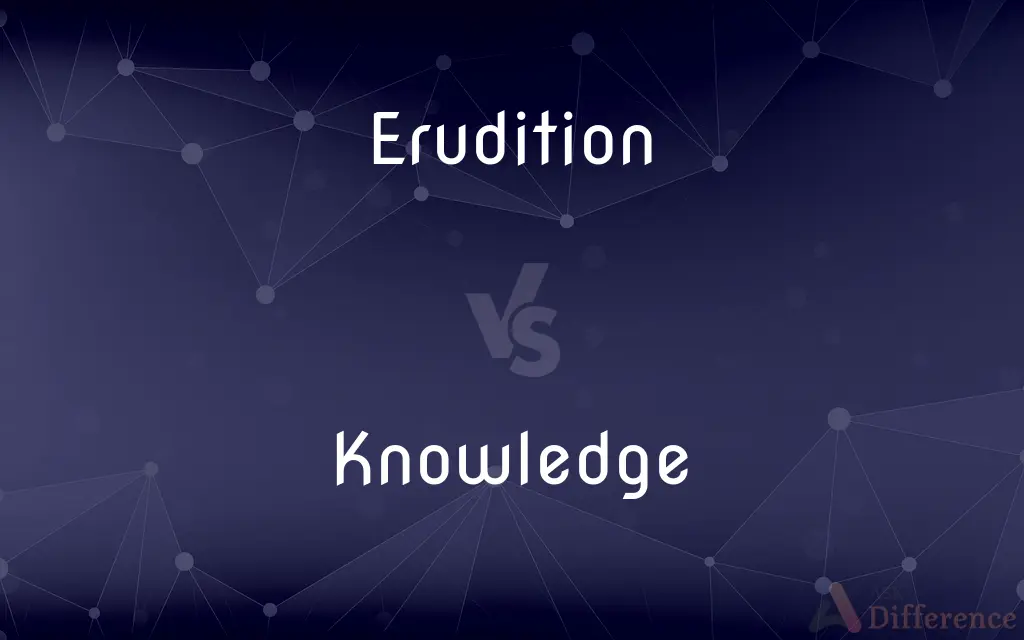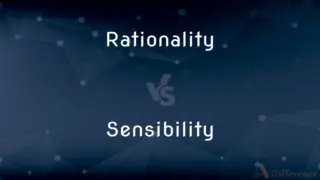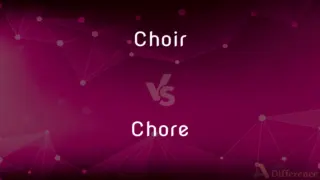Erudition vs. Knowledge — What's the Difference?
Edited by Tayyaba Rehman — By Urooj Arif — Updated on April 2, 2024
Erudition refers to deep, extensive learning, often formal and academic, while knowledge encompasses facts, information, and skills acquired through experience or education.

Difference Between Erudition and Knowledge
Table of Contents
ADVERTISEMENT
Key Differences
Erudition is marked by profound, often specialized learning acquired through extensive research, study, and academic pursuit. It implies a level of scholarship and an acquaintance with literature, science, or arts that is both deep and broad, often suggesting a formal, classical education. Knowledge, on the other hand, is a broader term that encompasses understanding, facts, and information gathered through experiences, education, or systematic study. While erudition conveys a sense of scholarly achievement, knowledge can be practical or theoretical, and it does not necessarily imply formal education.
Erudition often suggests a mastery of literature, history, and the arts, hinting at an individual's scholarly demeanor and intellectual sophistication. Knowledge, however, is more encompassing and can refer to both academic understanding and practical know-how. An individual might be knowledgeable about a wide range of topics or possess specific skills and expertise in a particular area without being considered erudite.
The acquisition of erudition typically involves deliberate and sustained effort to delve into academic disciplines, often resulting in an authoritative grasp of subjects. Knowledge acquisition, while it can also result from deliberate study, often includes learning through doing, personal experiences, and informal education. This difference underscores the more accessible and wide-ranging nature of knowledge compared to the more exclusive and specialized nature of erudition.
In the context of societal perception, erudition is frequently associated with prestige, intellectualism, and sometimes elitism, reflecting a high level of educational attainment. Knowledge, in contrast, is universally valued and recognized as essential for daily decision-making, problem-solving, and successful navigation through life. It carries a more democratic and practical connotation, emphasizing its utility and applicability.
Despite their differences, both erudition and knowledge are vital to personal growth, academic success, and the advancement of society. Erudition enriches cultural and intellectual discourse, while knowledge empowers individuals to achieve goals, make informed decisions, and adapt to an ever-changing world. The distinction between them highlights the spectrum of learning, from the practical to the profoundly scholarly.
ADVERTISEMENT
Comparison Chart
Definition
Deep, extensive learning in academic fields
Facts, information, and skills from experience or education
Scope
Often formal and specialized
Broad and general
Acquisition
Through rigorous study and academic research
Through experience, education, systematic study, and practice
Connotation
Scholarly, intellectual
Practical, universal
Associated with
Mastery of literature, arts, sciences
Practical skills, theoretical understanding
Examples in context
An erudite scholar discussing classical literature
A knowledgeable mechanic fixing a car
Compare with Definitions
Erudition
Intellectual depth and sophistication.
His conversation revealed an unexpected erudition.
Knowledge
Practical skills gained through direct experience.
Her knowledge of carpentry came from years of hands-on work.
Erudition
Extensive knowledge and learning acquired through academic pursuits.
Her erudition in ancient history impressed her colleagues.
Knowledge
The sum of what is known in various fields.
The encyclopedia aimed to compile human knowledge.
Erudition
Recognition for scholarly achievements.
The award celebrated her erudition and contributions to research.
Knowledge
Awareness or familiarity gained by experience.
Traveling extensively increased her knowledge of different cultures.
Erudition
Deep, scholarly understanding of a subject.
The professor's erudition was evident in his detailed lectures.
Knowledge
Information and understanding acquired through experience or education.
His extensive knowledge of the law helped him win the case.
Erudition
Mastery of complex ideas and literature.
His erudition was apparent in his writings and discourse.
Knowledge
Theoretical or factual understanding of subjects.
His knowledge of physics made him an excellent teacher.
Erudition
Deep, extensive learning.
Knowledge
Knowledge is a familiarity, awareness, or understanding of someone or something, such as facts (descriptive knowledge), skills (procedural knowledge), or objects (acquaintance knowledge). By most accounts, knowledge can be acquired in many different ways and from many sources, including but not limited to perception, reason, memory, testimony, scientific inquiry, education, and practice.
Erudition
Profound knowledge acquired from learning and scholarship.
Knowledge
Facts, information, and skills acquired through experience or education; the theoretical or practical understanding of a subject
A thirst for knowledge
Her considerable knowledge of antiques
Erudition
The refinement, polish and knowledge that education confers.
Knowledge
Awareness or familiarity gained by experience of a fact or situation
The programme had been developed without his knowledge
He denied all knowledge of the incidents
Erudition
The act of instructing; the result of thorough instruction; the state of being erudite or learned; the acquisitions gained by extensive reading or study; particularly, learning in literature or criticism, as distinct from the sciences; scholarship.
The management of a young lady's person is not be overlooked, but the erudition of her mind is much more to be regarded.
The gay young gentleman whose erudition sat so easily upon him.
Knowledge
The state or fact of knowing
Humans naturally aspire to knowledge.
Erudition
Profound scholarly knowledge
Knowledge
Familiarity, awareness, or understanding gained through experience or study
Has great knowledge of these parts.
Has only limited knowledge of chemistry.
Knowledge
The sum or range of what has been perceived, discovered, or learned
The extraordinary knowledge housed in the library.
Knowledge
(Archaic) Carnal knowledge.
Knowledge
The fact of knowing about something; general understanding or familiarity with a subject, place, situation etc.
His knowledge of Iceland was limited to what he'd seen on the Travel Channel.
Knowledge
Awareness of a particular fact or situation; a state of having been informed or made aware of something.
Knowledge
Intellectual understanding; the state of appreciating truth or information.
Knowledge consists in recognizing the difference between good and bad decisions.
Knowledge
Familiarity or understanding of a particular skill, branch of learning etc.
Does your friend have any knowledge of hieroglyphs, perchance?
A secretary should have a good knowledge of shorthand.
Knowledge
(philosophical) Justified true belief
Knowledge
(obsolete) Information or intelligence about something; notice.
Knowledge
The total of what is known; all information and products of learning.
His library contained the accumulated knowledge of the Greeks and Romans.
Knowledge
(countable) Something that can be known; a branch of learning; a piece of information; a science.
Knowledge
(obsolete) Acknowledgement.
Knowledge
(obsolete) Notice, awareness.
Knowledge
The deep familiarity with certain routes and places of interest required by taxicab drivers working in London, England.
Knowledge
(obsolete) To confess as true; to acknowledge.
Knowledge
The act or state of knowing; clear perception of fact, truth, or duty; certain apprehension; familiar cognizance; cognition.
Knowledge, which is the highest degree of the speculative faculties, consists in the perception of the truth of affirmative or negative propositions.
Knowledge
That which is or may be known; the object of an act of knowing; a cognition; - chiefly used in the plural.
There is a great difference in the delivery of the mathematics, which are the most abstracted of knowledges.
Knowledges is a term in frequent use by Bacon, and, though now obsolete, should be revived, as without it we are compelled to borrow "cognitions" to express its import.
To use a word of Bacon's, now unfortunately obsolete, we must determine the relative value of knowledges.
Knowledge
That which is gained and preserved by knowing; instruction; acquaintance; enlightenment; learning; scholarship; erudition.
Knowledge puffeth up, but charity edifieth.
Ignorance is the curse of God;Knowledge, the wing wherewith we fly to heaven.
Knowledge
That familiarity which is gained by actual experience; practical skill; as, a knowledge of life.
Shipmen that had knowledge of the sea.
Knowledge
Scope of information; cognizance; notice; as, it has not come to my knowledge.
Why have I found grace in thine eyes, that thou shouldst take knowledge of me?
Knowledge
To acknowledge.
Knowledge
The psychological result of perception and learning and reasoning
Common Curiosities
How can one acquire erudition?
Acquiring erudition typically involves rigorous study, academic research, and a sustained effort to delve deeply into scholarly subjects.
What is erudition?
Erudition is deep, extensive learning and knowledge, especially of a scholarly nature, often acquired through academic pursuits.
How does erudition differ from knowledge?
Erudition refers specifically to deep, often specialized learning acquired through formal education, while knowledge encompasses a broader range of facts, information, and skills acquired through experience or education.
Is erudition necessary for success?
While erudition can contribute to success in academic and some professional fields, knowledge and practical skills are essential for success across a broader range of activities and professions.
What role does erudition play in society?
Erudition enriches cultural, academic, and intellectual discourse, contributing to the advancement of knowledge and understanding in various fields.
How can knowledge be applied in daily life?
Knowledge can be applied in everyday decision-making, problem-solving, and the effective performance of tasks and jobs, enhancing personal and professional growth.
Does knowledge have to be formal?
No, knowledge can be both formal, acquired through education, and informal, gained through life experiences and personal learning.
Can someone be knowledgeable without being erudite?
Yes, an individual can be knowledgeable in various areas without necessarily being considered erudite, which implies a high level of scholarly learning.
Is practical experience valued as much as academic learning?
Both practical experience and academic learning are valued, often complementing each other. The value placed on each can vary depending on the context and specific fields.
Can erudition be considered elitist?
While erudition is often associated with intellectualism and high levels of education, it can be perceived as elitist if it implies superiority over others’ knowledge or learning methods.
Share Your Discovery

Previous Comparison
Rationality vs. Sensibility
Next Comparison
Choir vs. ChoreAuthor Spotlight
Written by
Urooj ArifUrooj is a skilled content writer at Ask Difference, known for her exceptional ability to simplify complex topics into engaging and informative content. With a passion for research and a flair for clear, concise writing, she consistently delivers articles that resonate with our diverse audience.
Edited by
Tayyaba RehmanTayyaba Rehman is a distinguished writer, currently serving as a primary contributor to askdifference.com. As a researcher in semantics and etymology, Tayyaba's passion for the complexity of languages and their distinctions has found a perfect home on the platform. Tayyaba delves into the intricacies of language, distinguishing between commonly confused words and phrases, thereby providing clarity for readers worldwide.













































